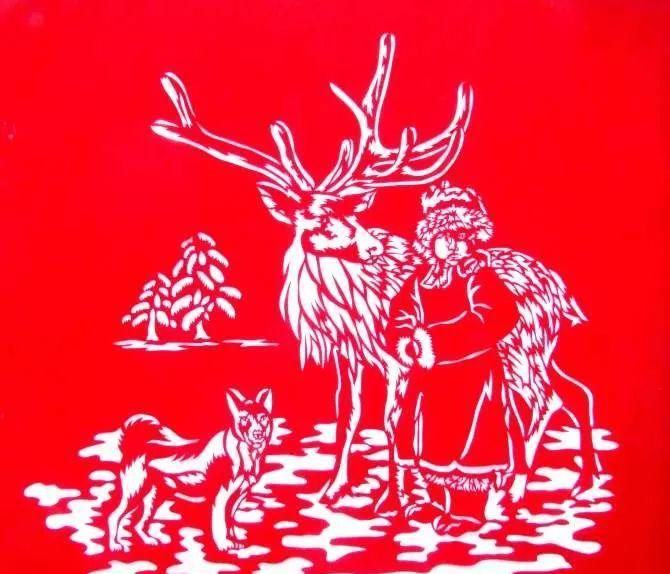
Paper-cut Ao Huiming
"Evenk" is a national self-designation, previously known as "Sauron", "Tunguska", "Yakutia", etc., in 1957, when the national identity was confirmed, according to the will of the ethnic group, the clan was called "Evenk". The reason why there are such diverse ethnic names is due to the frequent migration of the Evenk people in history, coupled with the large dispersion of the inhabited areas, which are separated from each other, resulting in certain differences in the way of life and production, which are regarded by others as different ethnic groups.
"Solun" is the Manchu name for the Evenk people, and in Manchu the word "Sauron" has a rich meaning, meaning "pioneer", "shooter" and "please come". Because, in history, the Evenk people are a brave and brave british people who are good at shooting and charging into battle. Some scholars believe that the word "Sauron" is a umlaut of the Word Evenk "sologon" (Sologon), and the book "Evenk Place Names Examination" points out that "Sauron" has the meaning of "east", "left side of the river", "upstream of the river", "on the uphill slope", etc., and sometimes means "... People", such as "sologon haahar" (Sologen Hahar) is the meaning of haher who lives upstream.
The "Solun" Evenk people have the largest number and the widest dispersion, mainly living in the Ewenke Autonomous Banner, Arong Banner, Moqi, Zalantun and other places in Hulunbuir City, Inner Mongolia Autonomous Region, and are now mainly engaged in nomadic animal husbandry and agricultural production. "Tunguska" is the Yakut name for the neighboring Evenks, which later became the Russian name for the Evenks around Lake Baikal. Because it lived along the Hamunikan River while in Russia, it is also known as "Hamunikan". The "Tunguska" Evenk people mainly live in Chenbal Tiger Banner, Hulunbuir City, Inner Mongolia Autonomous Region, and are engaged in animal husbandry. "Yakutia" is a Russian name for the Evenks, a part of the Yakuts who once lived in mixed with the Yakuts in Russia. The "Yakut" Evenk people, also known as the envoy deer Ewenke because of their reindeer breeding, live in Aoluguya Township, Genhe, Hulunbuir City, Inner Mongolia Autonomous Region, and are mainly engaged in reindeer farming. At the enlarged meeting of the Nationalities Committee of the Hulunbuir League in 1957, the representatives of various tribes and the broad masses of the people abolished the names "Sauron", "Tunguska" and "Yakutia" according to "Sauron", "Tunguska" and "Yakutia", and restored the self-designation of their own people, and were uniformly called "Evenk".
The meaning of the word "Evenk" is also controversial, and the "Brief History of the Evenk" believes that "the meaning of the self-designation of 'Evenk', according to the survey, the Evenk people called the large mountain forests around Siberia, including the Waixing'an Mountains, the Lena River, the Amazar River and other regions, 'Ohgden' (Big Mountain Forest), and the people who lived in these big mountain forests were called 'Evenk', and 'Evenk' means 'people living in the big mountain forest'; There is also a saying: 'People who live on the southern slopes of the mountain'. Both explanations say that the Evenk people lived in the mountains and forests. It fully shows that the Evenk people have been a hunting people who live in large mountain forests since ancient times. ”
Uyun Dagu discusses the meaning of the word "Evenk" from a linguistic point of view. When some evenk clans living in Siberia answered questions from outsiders, the self-proclaimed ewenki who lived by the river and the oronki who lived in the mountains called themselves oronki. Based on this, he examined these two words. Ewe one means "down" or "down". Oroon one means "above", "on top". -nki is the "constructor" ending that represents the functional attribute of the body. Ewenki means "going down (people)" or "coming down (people)", oroonki means "top (people)" or "above (people)", and the two are symmetrical with each other.
The Ewenke tribes and their branches everywhere generally call themselves ewenki o the famous Ewenki o Evenk scholar Chok also holds this view, believing that the meaning of the word "Evenk" is "people who came down from the mountains".
It is also believed that the name is related to the reindeer once raised by the Evenk people, "Oko" means "moss fresh" in the Evenk language, which is the main food of reindeer, so the evenk family name is likely to reflect the Evenk way of life of raising reindeer.
Although the word "Evenk" has various interpretations in its meaning, the Evenk people basically consider themselves to be a people living in the mountains and forests, with the hunting of reindeer as the main way of life. In the early years, they may have lived in the mountains and forests around Siberia, but for some reason some of them left Siberia and went south to heilongjiang, ussuri and later to the Daxinganling region.
Paper cut: Ao Huiming
..........................
Source: Inner Mongolia Hulunbuir Tourism Network